Sample Noise Complaint Letter To Landlord
[Your Name]
[Your Address]
[City, State, ZIP Code]
[Email Address]
[Phone Number]
[Date]
[Landlord's Name]
[Landlord's Address]
[City, State, ZIP Code]
Subject: Noise Complaint and Request for Resolution
Dear [Landlord's Name],
I hope this letter finds you well. I am writing to bring to your attention an ongoing issue regarding excessive noise in the [Apartment/House Unit Number] at [Property Address]. As a tenant, I understand the importance of maintaining a peaceful living environment for all residents, and I believe it is necessary to address this matter promptly.
For the past [duration of the issue], I have been experiencing consistent disturbances caused by loud noises coming from [source of the noise, e.g., neighboring apartment, common areas, construction, etc.]. These disturbances occur during various times of the day and night, making it difficult for me to enjoy a peaceful and restful living space. The noise primarily consists of [describe the type of noise, e.g., loud music, shouting, banging, etc.].
I have attempted to address the issue on my own by [mention any steps you have taken, such as speaking to the neighbors, reporting the issue to building management, etc.], but unfortunately, the situation has not improved. As a result, I kindly request your assistance in resolving this matter to ensure a comfortable and quiet living environment for all residents.
I understand that managing noise complaints is an integral part of maintaining a harmonious community, and I trust that you will take the necessary steps to address this concern. My hope is that you can communicate with the relevant parties involved and take appropriate action to mitigate the noise issue. This could include speaking to the neighbors, implementing noise insulation measures, or any other solution that you deem suitable.
I appreciate your prompt attention to this matter. Please keep me informed of the steps being taken to address the noise concern and provide an estimated timeline for its resolution. If necessary, I am willing to discuss this matter further or provide any additional information that may be helpful in resolving the issue.
Thank you for your understanding and cooperation. I look forward to a swift resolution of this matter, allowing all residents to enjoy a peaceful and comfortable living environment.
Sincerely,
[Your Signature if sending a printed letter]
[Your Typed Name]
[Attachments: Any supporting evidence or documentation, such as noise recording, if available]
Formal Noise Complaint Letter to Landlord
Subject: Noise Complaint Regarding [Apartment/Unit Number]
Dear [Landlord's Name],
I am writing to formally notify you of persistent noise disturbances originating from [neighbor/unit/location] at [Property Address]. These disturbances occur during [specific times, e.g., late night hours] and have significantly affected my peace and comfort in my home.
I kindly request that you take the necessary measures to address this issue in accordance with our lease agreement and local housing regulations. Your prompt attention to this matter is greatly appreciated.
Sincerely,
[Your Name]
[Unit/Apartment Number]
[Contact Information]
Casual Noise Complaint Email to Landlord
Subject: Noise Concern at [Address]
Hi [Landlord's Name],
I hope you are doing well. I wanted to bring to your attention the ongoing noise coming from [neighbor/unit]. It happens mostly [time/frequency], and it’s becoming hard to concentrate/rest.
Could you please look into this when you have a chance? Thanks a lot for your help.
Best regards,
[Your Name]
[Unit Number]
Serious Noise Complaint Letter
Subject: Urgent Noise Complaint Notification
Dear [Landlord's Name],
I am compelled to formally complain about continuous noise disturbances from [neighbor/unit] at [Property Address]. Despite previous informal requests, the noise persists, particularly during [specific times], affecting my quality of life and well-being.
I request immediate intervention as per our lease terms and relevant local laws. Please acknowledge receipt of this letter and advise on the steps you will take to resolve this matter.
Sincerely,
[Your Name]
[Unit Number]
[Contact Information]
Preliminary Noise Complaint Letter
Subject: Noise Issue at [Property Address]
Dear [Landlord's Name],
I hope this message finds you well. I am experiencing ongoing noise from [neighbor/unit] during [specific times]. I wanted to notify you early in case measures can be taken to resolve it amicably.
Thank you for looking into this matter at your earliest convenience.
Regards,
[Your Name]
[Unit Number]
Follow-up Noise Complaint Letter
Subject: Follow-Up on Noise Complaint
Dear [Landlord's Name],
This letter serves as a follow-up to my previous complaint dated [date] regarding noise disturbances from [neighbor/unit]. Unfortunately, the situation has not improved, and the disturbances continue to affect my daily life.
I urge you to take immediate action to address this matter as stipulated in our lease agreement.
Sincerely,
[Your Name]
[Unit Number]
[Contact Information]
Friendly Reminder Noise Complaint Email
Subject: Gentle Reminder About Noise Issue
Hi [Landlord's Name],
Just a friendly reminder regarding the noise issue from [neighbor/unit] I mentioned on [date]. It’s still occurring during [time], and I would appreciate your assistance in resolving it.
Thank you for your attention.
Best,
[Your Name]
[Unit Number]
What is a Noise Complaint Letter to Landlord and Why You Need It
- A noise complaint letter is a formal or informal notice to a landlord regarding excessive or disruptive noise affecting a tenant.
- Purpose:
- Document the issue for legal or lease purposes.
- Request landlord intervention to maintain peace and habitability.
- Provide a formal record if escalation becomes necessary.
Who Should Send a Noise Complaint Letter to the Landlord
- Tenants experiencing persistent noise issues.
- Residents in multi-unit housing or shared buildings.
- Anyone affected by disturbances violating lease terms or local ordinances.
Whom Should the Noise Complaint Letter Be Addressed To
- Primary landlord or property management company.
- Leasing office or designated property manager.
- Optional: legal representative if escalating formally.
When to Send a Noise Complaint Letter
- When noise occurs repeatedly and affects quality of life.
- After informal verbal complaints have not resolved the issue.
- During lease term when tenant has right to quiet enjoyment.
- Prior to contacting authorities or seeking legal action.
Requirements and Prerequisites Before Sending
- Document dates, times, and nature of disturbances.
- Identify the source of noise (neighbor, construction, etc.).
- Review lease terms regarding quiet enjoyment.
- Keep prior informal communications for reference.
- Decide on tone: formal, casual, or serious depending on severity.
Formatting Guidelines for Noise Complaint Letters
- Length: 1–2 paragraphs for emails; up to one page for formal letters.
- Tone: Polite but firm; serious if repeated disturbances.
- Style: Professional for legal purposes, casual for initial contact.
- Mode: Email for speed; printed letter for formal documentation.
- Etiquette: Avoid emotional or accusatory language; focus on facts and request for resolution.
Elements and Structure of a Noise Complaint Letter
- Subject line: Clear purpose (e.g., "Noise Complaint Regarding [Unit/Address]").
- Greeting: Address landlord or property manager.
- Introduction: State the issue and your concern.
- Details: Describe noise, timing, frequency, and impact.
- Request: Specify action desired or resolution expected.
- Closing: Polite sign-off with contact information.
- Attachments: Optional evidence like audio logs or witness notes.
Common Mistakes to Avoid
- Using aggressive or threatening language.
- Providing vague descriptions without dates or times.
- Sending multiple complaints without documenting responses.
- Ignoring lease terms or local noise regulations.
- Failing to maintain copies of correspondence.
After Sending / Follow-up Actions
- Track landlord response and actions taken.
- Keep a record of any continued disturbances.
- Send follow-up letters if the issue persists.
- Escalate to legal or municipal authorities if unresolved.
Tricks and Tips for an Effective Noise Complaint Letter
- Keep a calm and factual tone.
- Include specific examples and evidence.
- Reference lease clauses or local ordinances supporting your complaint.
- Be clear about your expectations for resolution.
- Send via a trackable method (email read receipt or certified mail) for documentation.
FAQs About Noise Complaint Letters
- Q: Can I send a complaint even if I haven’t spoken to my neighbor?
A: Yes, but it’s often helpful to attempt polite communication first. - Q: Should I attach evidence?
A: If available, yes; it strengthens your case. - Q: How quickly should a landlord respond?
A: Usually within a reasonable timeframe; check your lease and local regulations. - Q: Can this letter lead to eviction of the neighbor?
A: Only if legal action or lease violation enforcement occurs; the letter initiates the process. - Q: Is email acceptable?
A: Yes, for record-keeping, but certified letters are stronger for formal complaints.

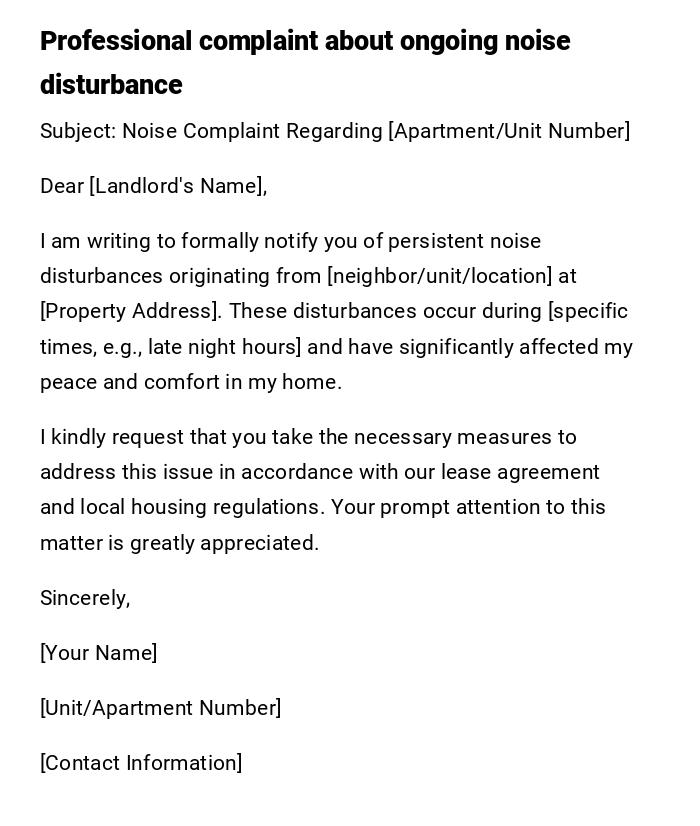
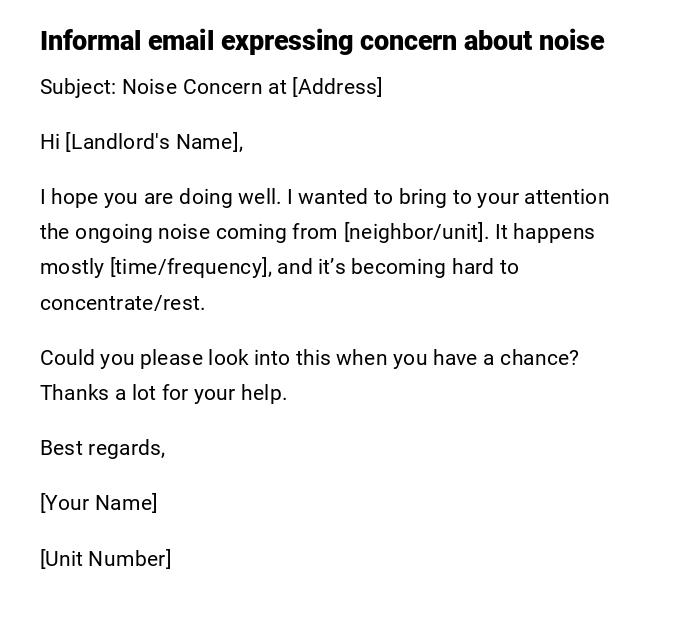
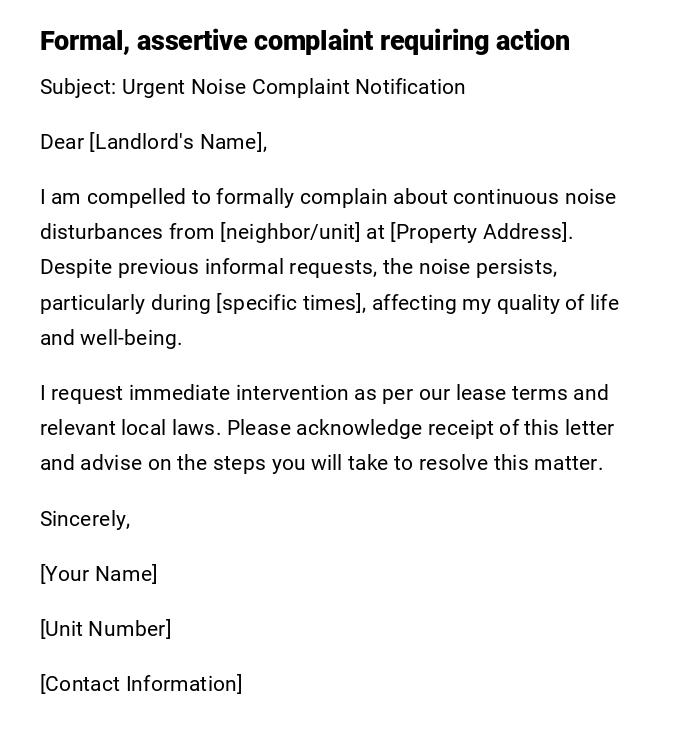
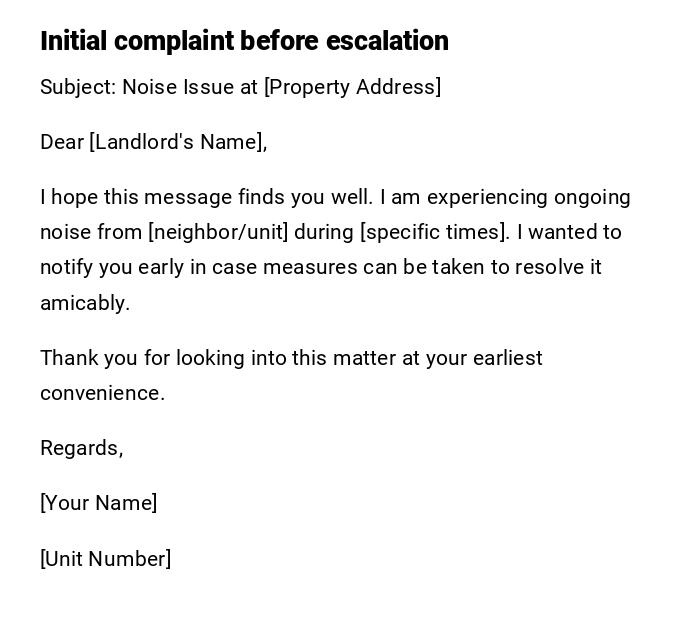
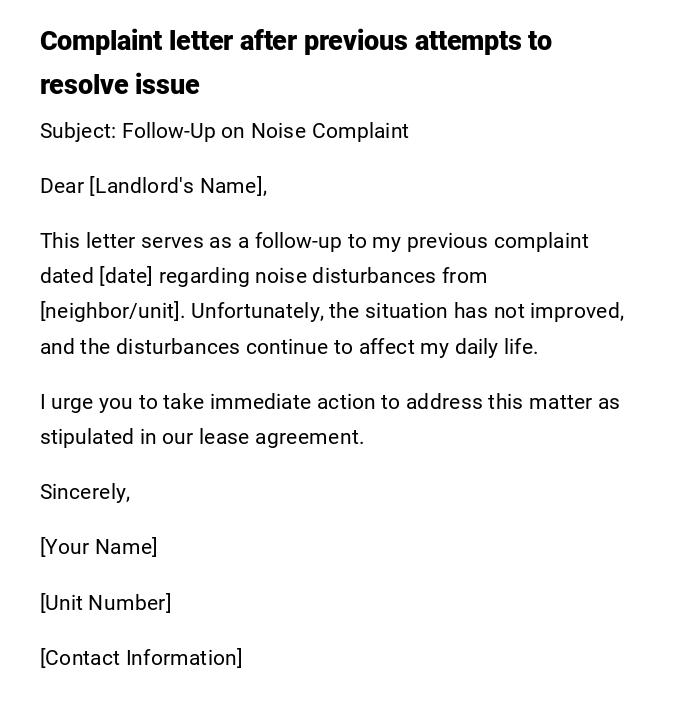
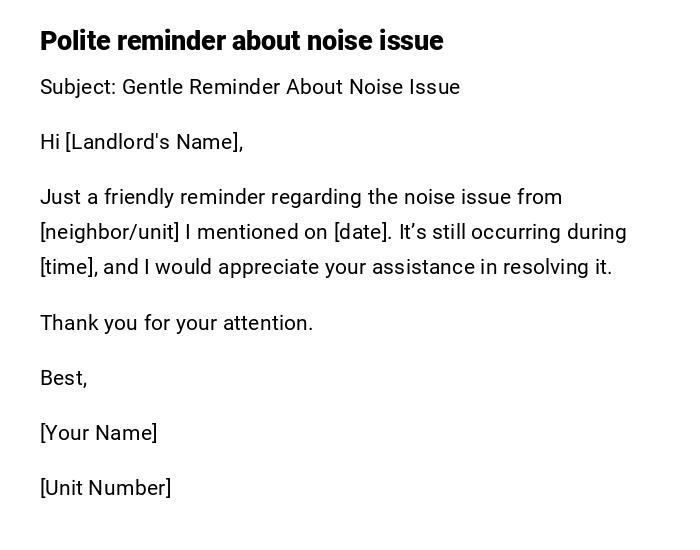

 Download Word Doc
Download Word Doc
 Download PDF
Download PDF